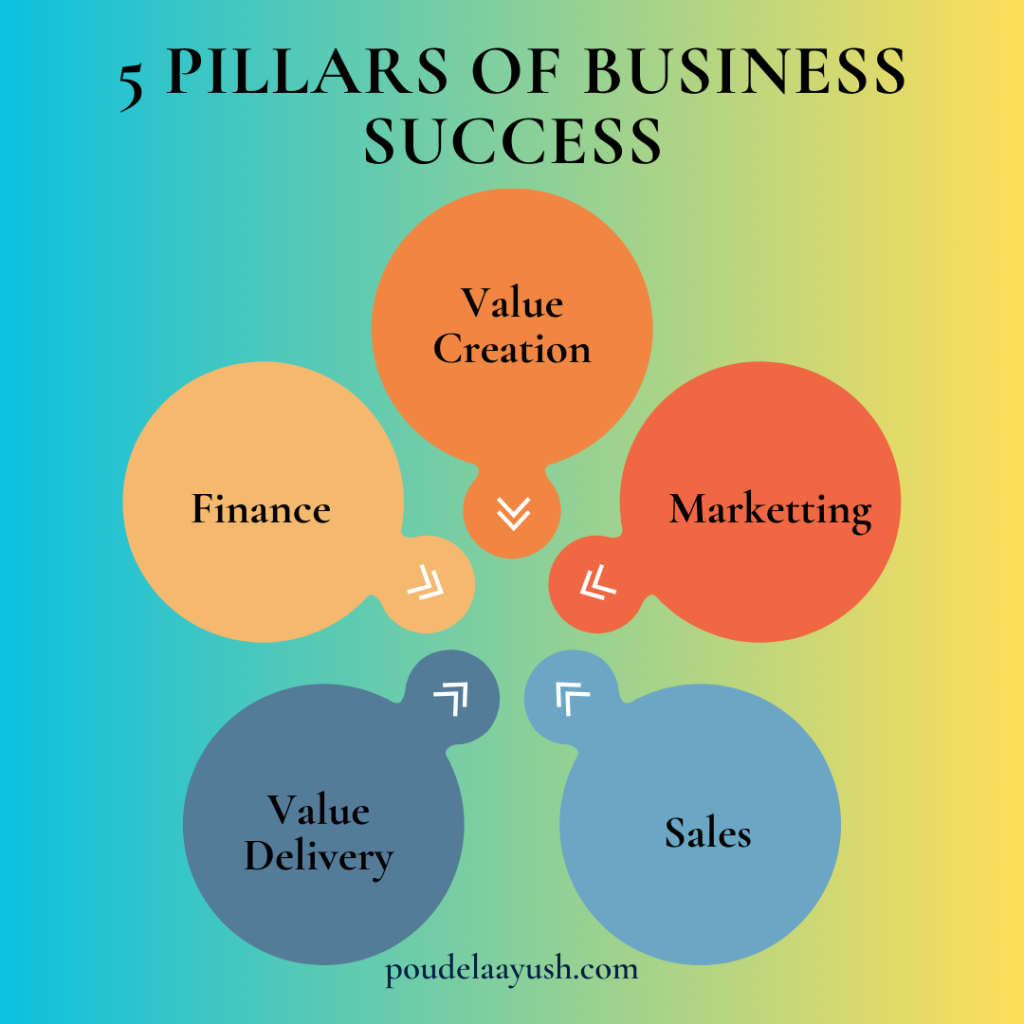
The Five Pillars of Business Success: Navigating the Competitive Landscape
In the dynamic world of business, success is not a matter of chance but a result of strategic alignment across five critical domains. These interconnected pillars form the foundation of sustainable growth, innovation, and competitive advantage.
1.Value Creation: The Heartbeat of Business Innovation
Value creation transcends mere product development—it’s the fundamental art of solving human problems and creating meaningful experiences. At its core, value creation is about:
Strategic Problem Solving
- Deep Customer Understanding: Going beyond surface-level needs to uncover latent desires and unaddressed challenges
- Innovative Solution Design: Crafting solutions that not only solve problems but re-imagine possibilities
- Holistic Value Perspective: Considering economic, social, and environmental impacts of business offerings
Differentiation Strategies
- Unique Value Proposition: Developing offerings that stand out in crowded markets
- Continuous Innovation: Embracing iterative improvement and breakthrough thinking
- Adaptive Capabilities: Quickly responding to changing market dynamics and customer expectations
Sustainable Impact
- Ethical Value Creation: Balancing profit with positive societal contributions
- Long-term Thinking: Designing solutions that create enduring value beyond immediate transactions
- Stakeholder Consideration: Addressing needs of customers, employees, communities, and the environment
2. Marketing: The Art of Meaningful Connection
Marketing is no longer about loud messaging but it’s creating genuine, resonant connections with target audiences.
Comprehensive Marketing Approach
- Precise Audience Targeting: Using data-driven insights to understand and segment markets
- Storytelling and Emotional Engagement: Crafting narratives that go beyond features to touch hearts
- Multichannel Strategy: Leveraging diverse platforms for integrated communication
Strategic Elements
- Product Positioning: Clearly articulating unique value and differentiation
- Brand Development: Building trust, credibility, and emotional loyalty
- Customer Journey Mapping: Understanding and optimizing every interaction
3. Sales: Transforming Connections into Opportunities
Sales is an intricate dance of relationship building, problem-solving, and value demonstration.
Sales Ecosystem
- B2B Sales: Complex, relationship-driven approach focusing on long-term partnerships
- B2C Sales: Direct, experience-oriented interactions emphasizing personal connection
Modern Sales Principles
- Consultative Selling: Prioritizing customer needs over transactional approaches
- Technology-Enabled Interactions: Leveraging CRM, analytics, and AI-driven insights
- Relationship-Centric Approach: Building trust through transparency and genuine value
4. Value Delivery: Turning Promises into Experiences
Value delivery is where strategic intentions transform into tangible customer experiences.
Operational Excellence
- Efficient Fulfillment: Streamlined processes ensuring timely, accurate deliveries
- Proactive Support: Anticipating and addressing potential customer challenges
- Quality Assurance: Consistent performance that meets or exceeds expectations
Customer Experience Design
- Seamless Connections: Integrated, friction-less interactions across all stages
- Personalization: Tailoring experiences to individual customer preferences
- Continuous Improvement: Regular feedback loops and adaptive service models
5. Finance: The Strategic Enabler of Business Potential
Finance is not just about managing money, but about strategically allocating resources to fuel growth and innovation.
Comprehensive Financial Management
- Strategic Capital Allocation: Intelligent investment in growth opportunities
- Risk Management: Balanced approach to financial planning and contingency preparation
- Performance Optimization: Efficient use of financial resources
Diverse Financial Domains
- Public Finance: Governmental economic management and resource distribution
- Corporate Finance: Strategic financial planning for organizational growth
- Personal Finance: Individual financial strategy and wealth management
- Global Financial Ecosystems: Understanding interconnected economic landscapes
Conclusion
Success emerges not from individual excellence, but from the harmonious integration of these five elements. Businesses that master this delicate balance create not just economic value, but meaningful, transformative experiences.
The most successful organizations view these pillars not as isolated functions, but as an interconnected system—constantly communicating, adapting, and evolving.
Remember: In today’s complex business landscape, agility, empathy, and strategic thinking are your most valuable assets.
